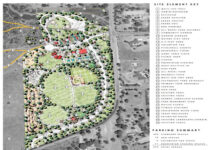The Jan. 25 meeting of the county’s Planning Commission included the review of proposed amendments to the county’s Zoning Ordinance, and a 6-0 vote with Michael Beck absent forwarded many of the recommendations to the San Diego County Board of Supervisors but required that modifications regarding health trailers and racing pigeons be returned to the Planning Commission after additional changes by staff.
Changes forwarded to the Board of Supervisors address accessory dwelling units, miniature wireless communications facilities, and county-owned property. The county’s Department of Planning and Development Services (PDS) expects the recommendations to be presented to the Board of Supervisors in late winter.
PDS periodically proposes updates to the Zoning Ordinance to improve the clarity of regulations, correct errors, comply with new state or Federal statutes, add definitions or regulations to address new uses or business practices, and streamline regulations. The current update also addresses October 2018 Board of Supervisors requests to provide more affordable housing in unincorporated San Diego County.
The proposed revisions on the health care trailers were intended to clarify the intent of the ordinance. “The intent of the health care trailer ordinance is for temporary transitional housing,” said PDS group program manager Eric Lardy.
The proposal would allow permits to be granted for three one-year periods subject to annual renewal. If there is a continued need after three years and the ownership has not changed — and if the owner has complied with provisions of the ordinance — the PDS director may grant up to two additional one-year renewals.
The permit may not be extended beyond five years and may be revoked for violation of any provision of the ordinance or other applicable ordinances. The trailer can be for either a recipient of physical care or for a caregiver providing physical care for the main dwelling unit, although a recipient of physical care living in the health trailer must be related to the main dwelling unit occupants by blood, marriage, or adoption. The proposed new regulations would also prohibit the coach or mobile home from being visible from the abutting streets and would require the trailer to be within 50 feet of the main dwelling unless a constraint renders that requirement unfeasible.
The new regulations would also require notification to surrounding property owners within 300 feet if an application is submitted and allow the PDS director to request a second opinion from a county-appointed physician if PDS receives evidence of non-compliance.
The proposed changes would require that the certificate of need confirm that the person requires physical assistance with one of seven specified activities: eating, bathing, continence, dressing, toileting, ambulating with or without assistive devices, or transferring to and from a bed, chair, or wheelchair.
“I’m very sensitive to the benefits of aging in place. At the same time I see the challenges of neighborhoods being infiltrated,” said planning commissioner Bryan Woods.
“This will help prevent fraud and abuse,” said Phillip Jellison.
Phillip and Gina Jellison live in Jamul. Two trailers on a neighboring property were added in 2017 and the residents’ daughters who are single mothers occupy those trailers. “It’s become a nice place for young women to raise their children. If that’s the case health and safety need to come into play,” Gina Jellison said.
Cass Hodgon of Descanso spent approximately $75,000 on his health care trailer including permits and told the Planning Commission that such an investment shouldn’t be subject to a five-year limit.
“There is no grandfathering under this proposal,” said Planning Commissioner David Pallinger.
The five-year period would begin once the new ordinance is adopted. “Existing medical use would be able to receive a five-year renewal,” Lardy said.
Ramona resident Mark Kiefer called for enforcement of violations rather than a limitation on the amount of time a trailer can be on a property. “There are rules in place for people who are breaking the law,” he said. “For a lot of people these are our only option.”
A mobile trailer is less expensive than a permanent accessory dwelling unit, but Susan Villa sought to build an accessory dwelling unit on her Spring Valley property for her mother, who is now 84, but was denied that alternative due to percolation issues. “This would be a better option for us,” she said.
“I think it’s admirable that every one of you take care of your families,” said Planning Commissioner Doug Barnhart.
“This is an item that shouldn’t be rammed through with 18 other items,” Barnhart said. “I’m not prepared to make a decision in the next five minutes.”
No opposition was presented to the revised definition of a trailer coach; that was forwarded for Board of Supervisors ratification. A trailer coach is any vehicle, with or without motive power, designed or used for human occupancy for residential, recreational, industrial, professional, or commercial purposes and shall include a camp car and travel trailer. A mobile home, which is addressed separately in the Zoning Ordinance, would no longer be considered a trailer coach.
The proposal to make racing pigeons subject to other animal enclosure setback, noise, particulate matter, and odor requirements was not opposed but was returned to staff to consider additional protections for neighbors. Valley Center residents Rick and Angela Greven have neighboring domesticated pigeons over their property and sought additional provisions covering the prohibition of the birds lingering on other premises and a prohibition against circling over other properties.
“We’ve had this problem for years, and unfortunately there’s no accountability,” said Angela Greven. “It is not regulated. It does pose a health concern.”
The Greven property is 2 1/2 acres. “It is becoming a more common issue,” Angela Greven said. “They fly eight hours a day six days a week.”
Greven noted that she and her husband could move from the area but would not be guaranteed to be free of pigeon nuisance. “The next place I go to could have the same issue,” she said.
“It’s a nuisance,” Woods said. “I do think that a limitation on the numbers would be appropri ate and no roosting would be appropriate.”
The county could pass an ordinance regarding birds on other properties, but the birds would likely leave before Code Enforcement could arrive. “I don’t see any way in the world you can enforce any of these,” said Planning Commissioner Michael Edwards.
Barnhart acknowledged that California regulations regarding pigeons on a property differ from those in his native Texas. “Where I was raised we had a solution for that,” he said.
A proposal to add Dark Sky Community regulations to Julian was also referred back to PDS so that the department and Julian residents could refine such regulations, although the proposal to add the Julian Community Planning Area to the zone which includes all other areas within a 15-mile radius of the Palomar Observatory or the Mount Laguna Observatory was forwarded to the Board of Supervisors. Zone A prohibits all outdoor lamps above 4050 lumens and all outdoor decorative lamps other than low-pressure sodium lamps which are fully shielded.
A Federal Communications Commission regulation on small wireless facilities took effect January 15 and requires all jurisdictions to adopt compliant regulations and limits to what jurisdictions can charge companies for small facilities. PDS added a definition of small wireless facilities to define them as facilities where each antenna is no more than three cubic feet in volume. PDS also placed a limit of 28 cubic feet for the wireless equipment and any pre-existing associated equipment on the structure, required facilities to be mounted on new or existing structures in the public right-of-way, permitted such facilities on private property if attached to an existing public utility pole or permitted telecommunication facility, and required small cell facilities on private property not attached to public utility poles to comply with discretionary permit application requirements.
“This allows us as an industry player to understand what the concerns are as a community and react,” said Verizon municipal engagement partner Michael Farraher.
“We look forward to working with the community on small cell development,” said Verizon real estate and regulatory affairs manager Shahriar Afshar.
“This critical infrastructure is no longer a convenience but a necessity,” said Crown Castle network real estate manager Tanya Friese.
Crest resident Pamela Mitchell noted that the phone systems Crest residents have are not deficient. “We live here for a reason,” Mitchell said. “We all moved to Crest for a rural atmosphere.”
Planning Commissioner Michael Seiler noted that the small cell systems do not have backup generation capabilities. “If the power goes out on the grid they will not have cell phone capabilities,” he said.
The fee portion of the proposed revisions requires all small cell wireless facility permit applicants to pay an issuance fee and place a deposit with PDS to cover inspection costs associated with the permit issuance. The applicant will also pay an annual use, maintenance, and access fee for each facility. The Board of Supervisors will determine the fee and deposit amounts.
A proposed allowance for guest living quarters would remove the 20,000 square foot minimum lot size to allow guest living quarters on land with Specific Plan zoning and residential zoning which currently requires the minimum lot size.













